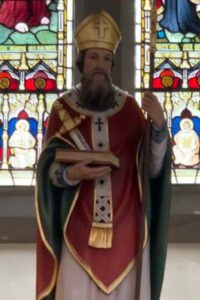Our patron
St. Boniface
 Winfed (later Boniface) was born in Crediton in 680AD and educated at a Benedictine Monastery in Exeter. He is credited with compiling the first dictionary of Latin grammar whilst head of a monastery in Hampshire. He was ordained as a priest in 710AD.
Winfed (later Boniface) was born in Crediton in 680AD and educated at a Benedictine Monastery in Exeter. He is credited with compiling the first dictionary of Latin grammar whilst head of a monastery in Hampshire. He was ordained as a priest in 710AD.
He felt called to Missionary work and whilst in Rome in May 719. Pope Gregory II commissioned him as a missionary to Germany and given the name Boniface. In accepting this commission he undertook to use the Roman (rather than the Celtic) formula for baptism.
In 722 he was consecrated as a Bishop “to preach to the heathen east of the Rhine” where he established convents and a system of Churches followed by the organisation of diocese and provinces all over Germany under the direction of the Pope.
A legend of this period states that on his arrival in Hesse, a lot of residual pagan beliefs and influences continues. Boniface struck at the root of pagan superstition by a single act. He publicly announced that he would destroy their gods. Armed with an axe he approached a sacred tree, the giant oak of Geismar, dedicated to Thor. After some effort, he felled the oak… its branches falling on the ground in the shape of a cross whilst crushed every other tree around except a single small fir tree (this was possibly the origin of the Christmas tree).
Boniface was sought for and gave advice to clerics in England during this time, many of these letters (and later) still exist.
In 732 he was consecrated as Archbishop (but with a specific archepiscopal see), founding 10 new sees around Germany.
In 741 he founded the abbey of Fulda with his young disciple (St Sturmi). In 745 he was given Mainz as his Cathedral and crated Primate of Germany by Pope Zachary.
In 753 Boniface set off for further Missionary work, in 754 he was martyred at the hands of a pagan band as he was reading to new convents on Pentecost Sunday; his body was taken to Fulda where it stills rests.
Boniface has had an enormous impact on English and European history, far beyond the conversion of people to Christianity. His guidance of the early church, his establishment of structures which allowed it to co-exist with the monarchy with Germany, were massively important. The educational and literary influence from his monasteries and churches in his lifetime and over the next centuries was significant.
St Boniface was canonized pre-congregation; he is the patron Saint of Germany and was made patron saint of Devon in 2019
Quick links
© Diocese of Plymouth 2019. All rights reserved
© Diocese of Plymouth 2019. All rights reserved
